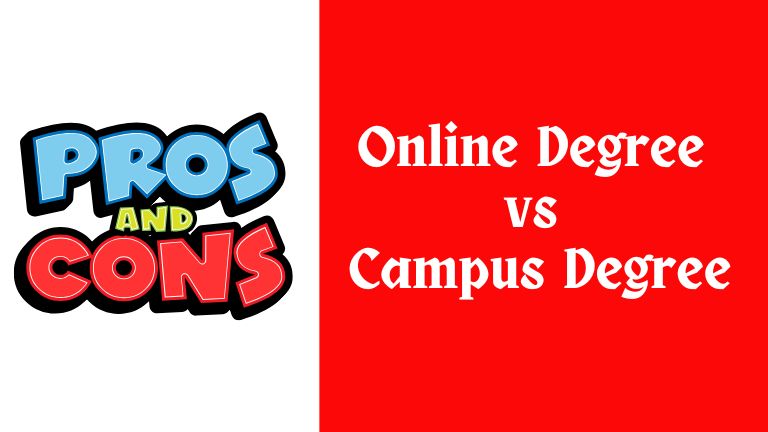In the fast-evolving education landscape of 2025, students face more choices than ever in how to pursue higher studies. One of the biggest debates today is between earning an online degree versus a traditional campus degree. Both paths have unique advantages and challenges, and the right choice depends on your career goals, lifestyle, budget, and preferred learning style.
With the growth of digital platforms and online education, online degrees are rapidly gaining popularity due to their flexibility and affordability. Meanwhile, campus-based degrees still hold strong value for their immersive environment, hands-on learning, and networking opportunities.
If you’re unsure about which is better for you, this guide breaks down the pros and cons of online vs campus degrees to help you make an informed choice.
What Is an Online Degree?
An online degree is a program delivered entirely through virtual classrooms, learning management systems like Moodle, Blackboard, or Google Classroom, where lectures, assignments, and exams are conducted online.
Popular Features:
- Live or recorded virtual lectures.
- Online assessments and project submissions.
- Flexibility to learn from any location.
- Often more affordable due to lower tuition and no campus housing costs.
What Is a Campus Degree?
A campus degree involves attending in-person classes at a university or college. This traditional mode offers face-to-face interaction with professors and peers, access to facilities, and a comprehensive student life experience.
Popular Features:
- Regular classroom learning with direct teacher interaction.
- Access to libraries, labs, workshops, and extracurricular activities.
- Opportunities for real-time peer networking.
- Strong alumni networks for career support.
Pros and Cons of Online Degrees
Pros:
- Flexibility: Study at your own pace and balance education with work or family.
- Cost-Effective: Savings on commuting, housing, and campus fees.
- Accessibility: Access prestigious programs regardless of location.
- Variety: Wide range of global programs in fields like Data Science, Business, and Psychology.
- Digital Literacy: Gain valuable skills using modern learning technologies.
Cons:
- Limited Networking: Fewer opportunities for face-to-face peer and faculty interactions.
- Requires Discipline: Strong self-motivation and time management are essential.
- Perceived Value: Some employers may still prefer traditional degrees.
- Practical Limitations: Hands-on labs and internships can be difficult to access.
Pros and Cons of Campus Degrees
Pros:
- Personal Interaction: Face-to-face engagement with teachers and classmates fosters richer learning.
- Campus Resources: Full access to labs, libraries, sports, and clubs.
- Structured Environment: Helps maintain a disciplined routine.
- Networking: Robust social connections, career fairs, and alumni engagement.
- Employer Recognition: Longstanding respect and preference in many industries.
Cons:
- Higher Costs: Tuition, accommodation, and living expenses add up substantially.
- Geographical Constraints: May require relocation or daily commuting.
- Less Flexibility: Fixed schedules may not suit working professionals or those with family commitments.
- Time Investment: Commuting and in-person attendance take additional time.
Online Degree vs Campus Degree: Which Should You Choose?
Your decision depends on your personal circumstances:
Choose an Online Degree if:
- You are balancing work, family, or other commitments.
- You seek an affordable higher education option.
- You prefer self-paced, digital learning environments.
- You want access to global programs without relocating.
Choose a Campus Degree if:
- You want the full social and immersive student experience.
- You value face-to-face mentorship and peer collaboration.
- You require hands-on training or lab work.
- You aim for a traditional degree with strong industry recognition.
Conclusion
Both online and campus degrees offer valuable pathways to advance your education and career. Online degrees excel in flexibility, affordability, and accessibility, perfect for working professionals and global learners. Campus degrees provide enriched interaction, experiential learning, and networking vital in many fields.
Ultimately, the right choice depends on your learning preferences, career goals, and lifestyle. Whichever path you pick, your dedication to applying the knowledge gained will define your success.
ALSO READ
How to Choose a Specialization in Master’s Degree
Apaar ID Card Registration Online
SAT Verbal Score Guide for College Admission Success
ABC ID Card Registration Online
